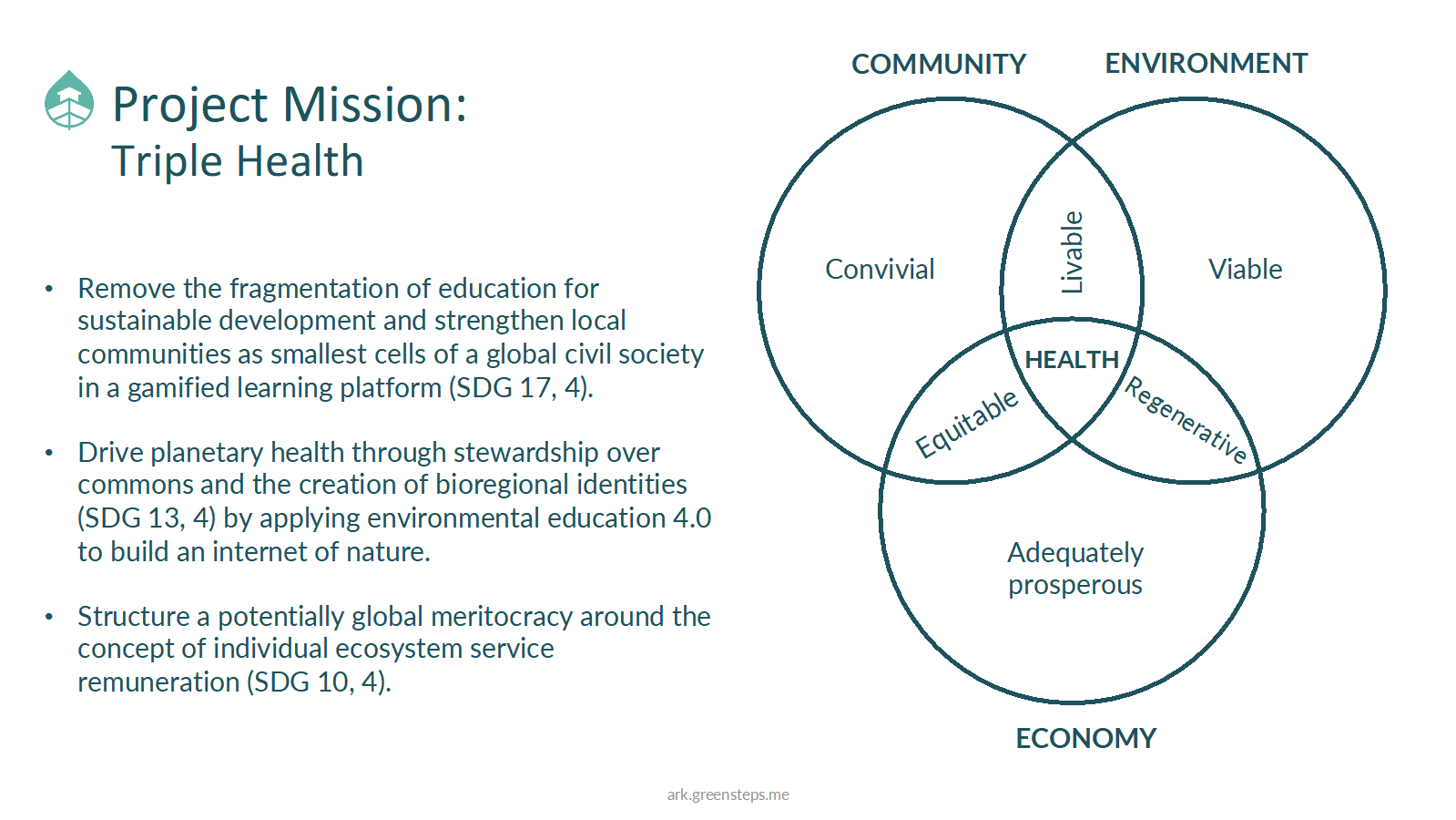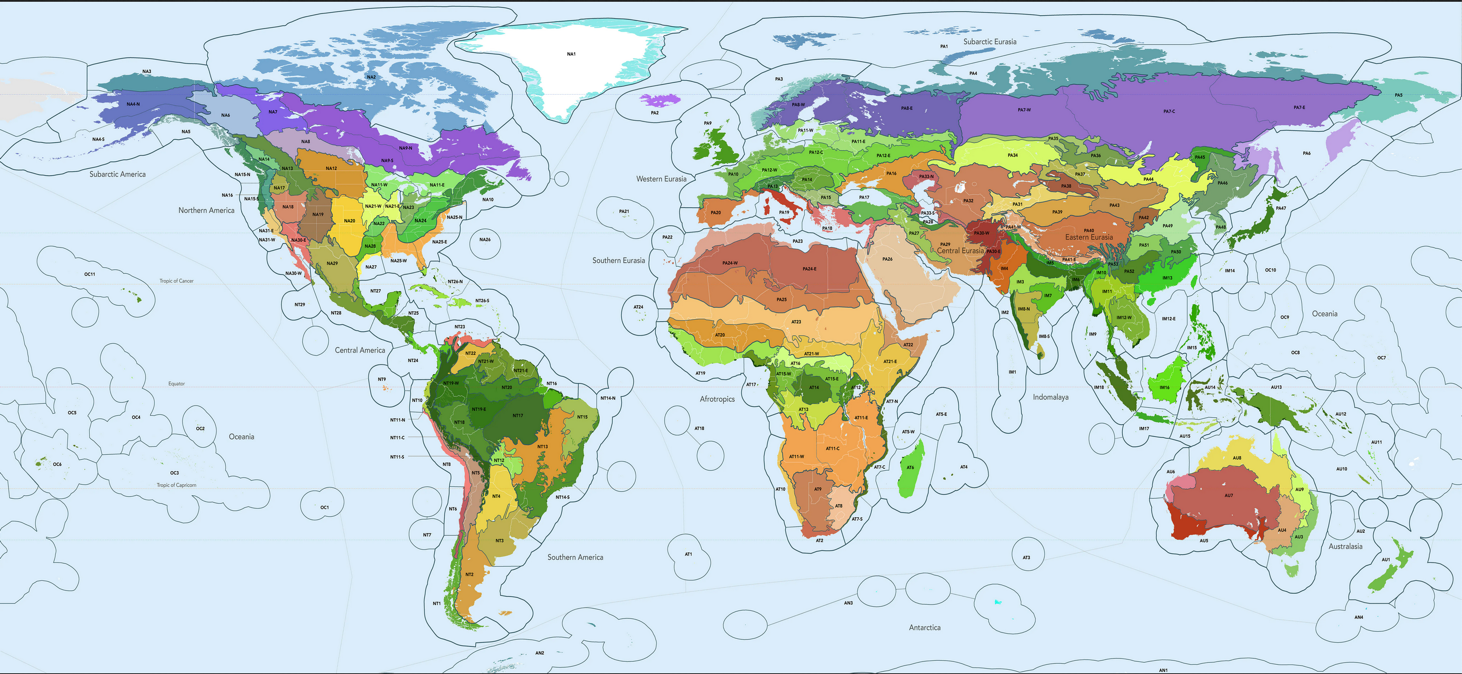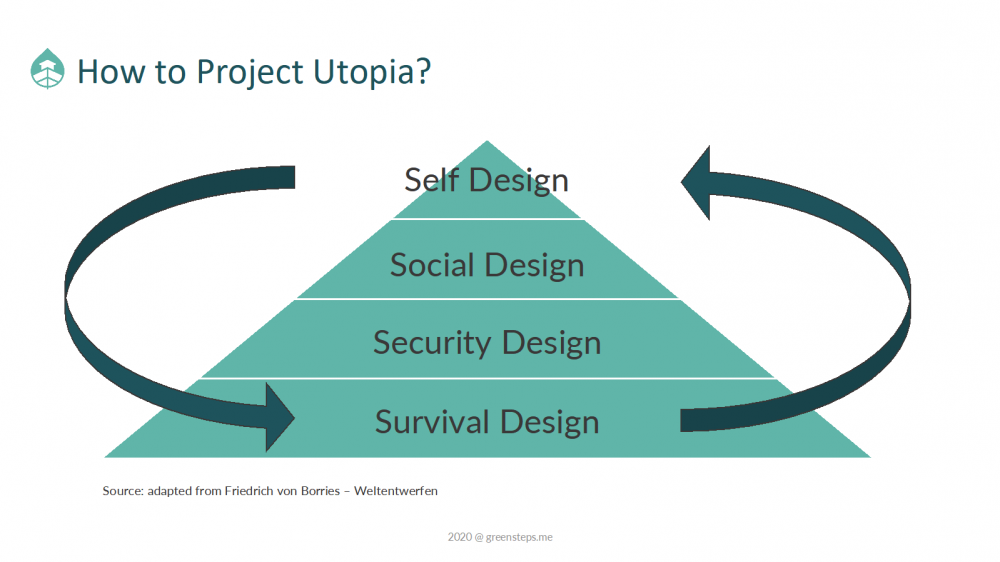WHITE PAPER
Abstract
Activate. Restore. Know. A fun platform to transform our societies for good.
ARK is short for Activate body & mind, Restore the environment, Know your bioregion. The ARK is a gamified social network which uses a highly scalable technology and a sustainable social business model to exponentially accelerate bottom-up climate change adaptation measures. It offers a clearly structured step-by-step learning journey to users in local communities; and a global collaborative library of best practices to facilitators. The ARK uses the power of technology to drive long term behavioral change in offline communities.
The Green Steps ARK is geared towards realizing triple health. Project phase 1 strengthens and connects local communities as smallest cells of a global civil society in a gamified learning platform about education for sustainable development (SDG 17, 4). Phase 2 pioneers the internet of nature and drives planetary health through stewardship over commons and the creation of bioregional identities (SDG 13, 4). Phase 3 structures a conditional universal basic income and redistributes wealth globally through meritocratic ecosystem service remuneration (SDG 10, 4).
Download here a project briefing.
Continue to read here or download the full white paper from researchgate.
The Problem
Automation through robots and algorithms will make human labor in the course of the next few years largely obsolete. People will nevertheless need both an occupation and an income to live in dignity. A new social contract is required but spreading nationalism and decreasing wealth distribution makes the implementation increasingly unlikely. One thing is sure: jobs disappear faster than national politicians will find a consensus on a solution. It is therefore the civil society and individual self-responsibility which has to push for a solution to the problem; and the solution must be radical.
Blockchain technology has set out to solve the problem of power concentration in centralized national banks by e.g. establishing with Bitcoin a digital currency which is secure and potentially decentralized. Bitcoin has nevertheless not solved the problem of scarcity, but in effect established a new scarcity system which operates along the same lines as fiat currencies: it is only a small tech savvy elite that is able to gross huge profits, while the masses have been left out. Bitcoin has moreover developed into an environmental threat as its operation, in particular its incremental proof of work (PoW), consumes huge amounts of energy.
The universal basic income (UBI) on the other hand, has been conceived as an unconditional income which resolves decreasing wealth distribution. However, it creates in societies similar to bitcoin and other cryptocurrencies a state of anomie. Anomie is best understood as insufficient normative regulation and leads to an alienation from common goals and values. Individuals lose sight of their shared interests based on mutual dependence. In this condition, they are less constrained by group norms. Normative values become generalized, rather than personally embraced.
On a planet with a population of eight to ten billion a universal basic income needs to encourage sustainable behavior in the social, environmental and economic realm. We need incentives to collaborate on a global scale and these incentives need to align global goals with things that matter to our individual lives. Ethical questions about how to structure such a conditional universal basic income therefore take center stage.
Should somebody who disposes of used batteries in a pristine lake or spills cooking oil into the kitchen sink receive the same basic income as a person that collects used batteries and cooking oil and brings them to a recycling center? Should somebody who consumes enormous amounts of energy to mine for cryptocurrencies pay for electricity the same price as an average household? Such ethical questions need to be addressed in a global economic framework for which nation state governments are too slow to find an agreement on.
We need an economic system that encourages us to do the right things; we need a conditional basic income embedded in a sustainable universal currency, which is based on a PoW that does not encourage meaningless calculations performed by algorithms but a PoW which is connected to our own impact on self, others and planet.
We need a conditional universal basic income that is subject to continuous learning (eradicating ignorance) and proper behavior (reducing negative social and environmental impact). We need an economic system which motivates humanity to focus on contribution to the system at large (globalism) instead of system fragments (nationalism, corporatism, family mindedness, egoism).
We moreover need a currency which can be attained by creative collaboration instead of destructive competition. It is this transition which poses probably the biggest problem, because competition has been ingrained to such a depth into our cultures and is brought to a new high through accelerating technology and 20th century industrial economics rejuvenated by 21st century China.

The Solution: Green Steps ARK
The ARK establishes a blockchain based currency which does not store profit made but is rewarded for social and environmental value created. The ARK empowers a paradigm shift from HAVING to BEING, from investing into a currency as a storage of profit extracted to being rewarded for meaningfully investment in self, others and planet.
In an environment which requires us to transform our habits of consumption, learning how to adapt and learning how to live sustainably, turns into the work required from each one of us. Our contribution in form of individual ecosystem services are Proof of Work. Our interdependence with a commons and/or a community are Proof of Stake (PoS).
The ARK uses the map of terrestrial ecoregions to structure human ecosystem service contribution and therefore pioneers post-national economics geared towards human flourishing and planetary health.

Martin Ford summarizes the threatening connection between social and environmental crisis like this:
The greatest risk is that we could face a “perfect storm” – a situation where technological unemployment and environmental impact unfold roughly in parallel, reinforcing and perhaps even amplifying each other. If, however, we can fully leverage advancing technology as a solution – while recognizing and adapting to its implications for employment and the distribution of income – then the outcome is likely to be far more optimistic. Negotiating a path through these entangled forces and crafting a future that offers broad-based security and prosperity may prove to be the greatest challenge for our time. Understanding education as a public good which must not be influenced by competitive profit or power maximation is key to finding that path.
System Principles
The ARK establishes a social currency with the mission of changing mankind’s value system from competition to cooperation, from scarcity to abundance, from greed to empathy, from profit extracted from people & planet to value added to people & planet.
- The ARK motivates people to focus on contribution and understands this planet and all its inhabitants as one system to which we have to contribute purposefully.
- The effective person focuses on contribution. He looks up from this work and outward toward goals. He asks, “What can I contribute that will significantly affect the performance and the results of the institution I serve?” His stress is on responsibility.
- The focus on contribution is the key to effectiveness: in one’s own work (its content, its level, its standards, and its impacts) in one’s relations with others) with superiors, associates, subordinates), and in the use of the tools such as meeting and reports.
- The great majority of people tend to focus downward. They are occupied with efforts rather than with results. They worry over what the organization and their superiors “owe” them and should do for them. And they are conscious above all of the authority they “should have.” As a result, they render themselves ineffectual.
- The man who focuses on efforts and who stresses his downward authority is a subordinate no matter how exalted his title and rank. But the man who focuses on contribution and who takes responsibility for results, no matter how junior, is in the most literal sense of the phrase “top management.” He holds himself accountable for the performance of the whole. That is the planet.
- The human who asks himself, What is the most important contribution I can make to the performance of this organization? Asks in effect, What self-development do I need? What knowledge and skill do I have to acquire to make the contribution I should be making? What strengths do I have to put to work? What standards do I have to set myself?The ARK motivates people to focus on contribution and understands this planet and all its inhabitants as one system to which we have to contribute purposefully.
- The ARK structures a conditional universal basic income: everybody age 12 and older can sign up for an individual ARK account, no matter which sex, nationality, race, or faith. Children below age 12 can use the ARK through a connected account with their legal guardian.
- The ARK structures a conditional income: registered individuals receive their income on the condition that they have acquired a minimum amount of Impact Points each month. It is subject to local governments and plutocrats to initiate regional pilot projects for these transfer payments, before a meaningful global north-south transfer structure has been found which empowers civil society to drive wealth redistribution and fair ecosystem service remuneration.
- The ARK structures a performance based basic income: every registered individual who has completed learning assignments and showed sustainable behavior receives Impact Points accordingly. Personal performance translates to community performance and community performance translates to humankind’s performance.
- The ARK is decentralized: by setting the proof of work on meaningful time spent on self, other or planet, no centralization can take place: every citizen of this planet is enabled to create value and perform individual ecosystem services. This decentralization is genuine, it is not only based on technological theory, but on human reality. As the use of mobile phones spreads throughout the world, everybody is able to sign up for an ARK account and participate – no expensive mining rigs are needed, but only one’s own time spent purposefully in a community registered on the ARK.
- The ARK is secure: blockchain technology will guarantee that existing records can’t be manipulated.
- Impact Points are units of time spent. 10 Impact Points equals 1 hour. As such a natural limitation is established on how many Impact Points can be created. Speculation, hording and system abuse are alien to the system design.
- The supply of time is totally inelastic. No matter how high the demand, the supply will not increase. There is no price for it and no marginal utility curve for it. Moreover, time is totally perishable and cannot be stored. Yesterday’s time is gone forever and will never come back. Time is, therefore, always in exceedingly short supply.
- Time is totally irreplaceable. Within limits we can substitute one resource for another, copper for aluminium, for instance. We can substitute capital for human labor. We can use more knowledge or more brawn. But there is no substitute for time.
- Everyhting requires time. It is the one true universal condition. All work takes place in time and uses up time. Yet most people take for granted this unique, irreplaceable, and necessary resource. Nothing else, perhaps, distinguishes effective executives as much as their tender loving care of time.
- Everybody can and should be the CEO of his time and be responsible for how it is spent. The ARK empowers individuals no matter where she is or who she is and transcends nationality, religion, education and gender.

- https://www.ted.com/talks/andrew_mcafee_what_will_future_jobs_look_like/transcript
- Thomas Piketty, Capital in the 21st Century
- Martin Ford, Rise of the Robots
- https://www.ted.com/talks/martin_ford_how_we_ll_earn_money_in_a_future_without_jobs
- http://satoshinakamoto.me/whitepaper/
- https://hackingdistributed.com/2018/01/15/decentralization-bitcoin-ethereum/
- https://en.wikipedia.org/wiki/Proof_of_work
- https://www.theverge.com/2017/12/21/16806772/bitcoin-cryptocurrency-energy-consumption-renewables-climate-change
- https://en.wikipedia.org/wiki/Universal_basic_income
- Nathan Schneider, Cryptoeconomics as a Limitation to Governance
- https://en.wikipedia.org/wiki/Proof_of_stake
- David Olsen et al., Terrestrial Ecoregions of the World: A New Map of Life on Earth